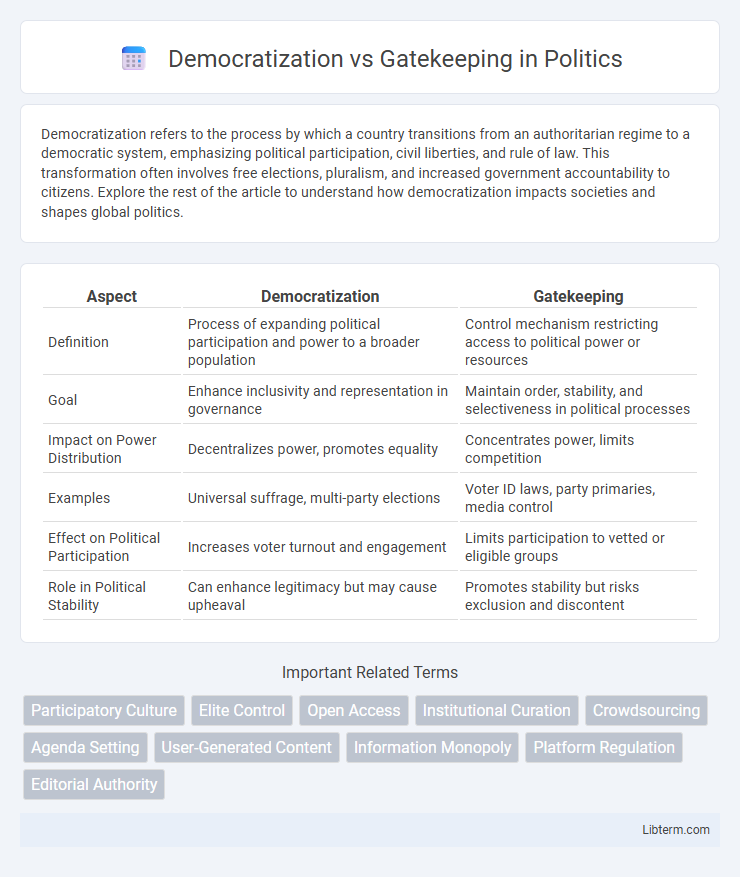Democratization refers to the process by which a country transitions from an authoritarian regime to a democratic system, emphasizing political participation, civil liberties, and rule of law. This transformation often involves free elections, pluralism, and increased government accountability to citizens. Explore the rest of the article to understand how democratization impacts societies and shapes global politics.
Table of Comparison
| Aspect | Democratization | Gatekeeping |
|---|---|---|
| Definition | Process of expanding political participation and power to a broader population | Control mechanism restricting access to political power or resources |
| Goal | Enhance inclusivity and representation in governance | Maintain order, stability, and selectiveness in political processes |
| Impact on Power Distribution | Decentralizes power, promotes equality | Concentrates power, limits competition |
| Examples | Universal suffrage, multi-party elections | Voter ID laws, party primaries, media control |
| Effect on Political Participation | Increases voter turnout and engagement | Limits participation to vetted or eligible groups |
| Role in Political Stability | Can enhance legitimacy but may cause upheaval | Promotes stability but risks exclusion and discontent |
Understanding Democratization in Media
Understanding democratization in media involves recognizing the shift from centralized control to broader public access and participation in content creation and distribution. Digital platforms and social media have empowered individuals and marginalized groups to produce and share information without traditional gatekeepers, enhancing diversity and pluralism in voices and perspectives. This transformation challenges established media institutions while promoting transparency, engagement, and more equitable information flow.
The Concept of Gatekeeping Explained
Gatekeeping refers to the control and regulation of information flow by individuals or institutions, determining what content reaches the public. In media and communication, gatekeepers act as filters that influence public opinion by selecting which news stories, ideas, or messages are disseminated. This concept highlights the balance between centralized control and widespread access, impacting the democratization of information in digital and traditional platforms.
Historical Perspectives on Information Control
Historical perspectives on information control reveal a persistent tension between democratization and gatekeeping, where access to knowledge was traditionally restricted by institutions such as monarchies, religious authorities, and colonial powers to maintain social hierarchies. The invention of the printing press in the 15th century marked a significant shift, enabling the wider dissemination of information and challenging gatekeepers' monopoly by facilitating literacy and public discourse. In the digital age, the internet further accelerates democratization by decentralizing information distribution, yet new forms of gatekeeping emerge through algorithmic biases and platform regulations, raising ongoing debates about freedom of information versus control.
Key Differences Between Democratization and Gatekeeping
Democratization emphasizes widespread access and participation, enabling diverse individuals to contribute and influence decision-making processes, while gatekeeping involves controlling access and maintaining selective entry based on specific criteria or standards. Key differences include the level of inclusivity, where democratization promotes open engagement across a broad audience, and gatekeeping prioritizes exclusivity and quality control through filtering mechanisms. The impact on information flow is also distinct, as democratization often accelerates dissemination and diversity of viewpoints, whereas gatekeeping regulates content to uphold authority and consistency.
Impact on Public Discourse and Opinion
Democratization of information through digital platforms broadens access to diverse perspectives, empowering individuals to participate actively in public discourse and shape collective opinion. Gatekeeping, traditionally exercised by media institutions, filters content and influences which narratives reach the public, thereby shaping dominant viewpoints and framing issues. The tension between democratization and gatekeeping profoundly impacts the formation of public opinion, media trust, and the quality of democratic engagement.
Advantages of Democratized Information Flow
Democratized information flow enhances transparency and empowers individuals by providing equal access to data and knowledge regardless of social or economic status. This open exchange fosters innovation and collaboration by enabling diverse perspectives to contribute to problem-solving and decision-making processes. Greater inclusivity in information dissemination reduces biases and promotes informed participation across all sectors of society.
Risks and Challenges of Reduced Gatekeeping
Reduced gatekeeping in democratization processes often leads to increased misinformation and lower content quality, as unvetted information circulates widely without expert validation. Platforms face challenges in balancing open access with maintaining credibility, risking audience trust erosion due to the proliferation of biased or false narratives. These risks complicate regulatory efforts and demand advanced algorithms to detect harmful content while preserving freedom of expression.
Case Studies: Media Evolution in the Digital Age
Case studies on media evolution in the digital age reveal that democratization has empowered diverse voices through platforms like social media and independent news sites, challenging traditional gatekeeping roles held by legacy media. The rise of user-generated content and algorithm-driven news feeds illustrates a shift towards more accessible information dissemination, yet gatekeeping persists via platform moderation policies and content algorithms that shape public discourse. Examining cases such as the Arab Spring and the 2016 U.S. election highlights how digital media's democratizing potential is both enabled and constrained by technological and regulatory structures governing information flow.
Balancing Open Access with Information Quality
Balancing open access with information quality requires navigating the tension between democratization and gatekeeping in digital content platforms. Democratization promotes widespread accessibility and encourages diverse contributions, while gatekeeping ensures accuracy, credibility, and prevents misinformation by applying rigorous editorial standards. Achieving equilibrium involves implementing transparent moderation policies and community-driven verification systems that uphold information integrity without stifling inclusive participation.
The Future of Media: Toward Cooperation or Conflict?
Democratization of media, fueled by digital platforms and social networks, challenges traditional gatekeeping by enabling diverse voices and user-generated content to reach mass audiences. This tension shapes the future of media as cooperation may emerge through hybrid models where institutional gatekeepers adopt algorithmic curation and participatory journalism to maintain credibility and relevance. Conflict arises when misinformation and echo chambers exploit democratized channels, prompting debates on regulatory frameworks that balance free expression with accountability.
Democratization Infographic

 libterm.com
libterm.com